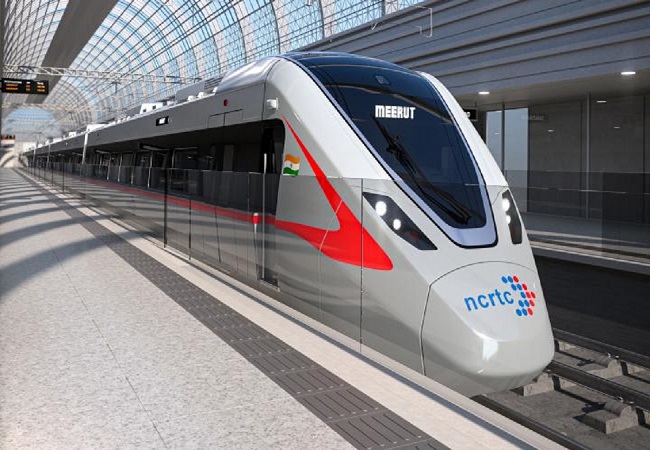New Delhi: The part of Uttar Pradesh within the National Capital Region (NCR) is set to become one of the fastest growing regions in the country in the next few years with the implementation of projects like the Meerut-Delhi Expressway and the Meerut-Ghaziabad-Delhi Rapid Rail.
Work is progressing fast on the ambitious Meerut-Ghaziabad-Delhi Rapid Rail Project, a joint venture of the Central Government and the Uttar Pradesh Government worth Rs 30,274 crore, and it is expected to become operational ahead of time.
The UP Government has allocated Rs 1326 crore for the project in its budget for the year 2021-2022. About 68 kilometres of this project falls in the UP region. The priority section of 17 kms between Sahibabad to Duhai is expected to be commissioned by 2023 and the entire corridor between Delhi and Meerut by 2025.
The Rapid Rail, which runs three times faster than Metro, is expected to boost development of the NCR. After completion of the project, the length of Delhi’s mass transit system including the Delhi Metro Rail Corporation (DMRC) and the Regional Rapid Transit System (RRTS) network will be 743 kms, which is more than the length of London Cross Rail, Hong Kong MTR and Paris RER.
Virendra Kumar, GM of RRTS, said that about Rs 650 crore was given by the UP Government for this project last year. The Yogi Government has also allowed work on 20 pieces of land and the land is likely to be transferred to the RRTS soon.
Delhi-Ghaziabad-Meerut RRTS corridor to have 24 stations
The total length of the Meerut-Ghaziabad-Delhi Rapid Rail Project is 82.15 kms. Local transport services will also be available in Meerut on RRTS network. For this, 13 stations will be built in a distance of 21 kms. The Delhi-Ghaziabad-Meerut RRTS corridor will have 24 stations, including two depot stations. The stations include Sarai Kale Khan, New Ashok Nagar, Anand Vihar, Sahibabad, Ghaziabad, Guldhar, Duhai, Duhai Depot, Muradnagar, Modi Nagar South, Modi Nagar North, Meerut South, Partapur, Rithani, Shatabdi Nagar, Brahmapuri, Meerut Central, Bhainsali, Begumpul, MES Colony, Daurali Metro, Meerut North, Modipuram and Modipuram depots.
RRTS stations to be connected to airports, railway stations, ISBT and Metro
RRTS stations will be linked with various modes of transport such as airport, railway stations, Interstate Bus Terminus (ISBT) and Delhi Metro stations. This will facilitate the passengers to move from one place to another. All 3 corridors of Phase rising pollution level
Each RRTS train will have business class coaches to encourage the luxury loving people to leave their private vehicles and use public transport to curb pollution.
The modal share in favour of public transport in the region is expected to increase from 37 per cent to 63 per cent with the commissioning of the Delhi-Ghaziabad-Meerut RRTS corridor.
-I will meet at Sarai Kale Khan and will be interoperable, which will help passengers to travel from one corridor to another without changing trains.
RRTS to help curb rising pollution level
Each RRTS train will have business class coaches to encourage the luxury loving people to leave their private vehicles and use public transport to curb pollution. The modal share in favour of public transport in the region is expected to increase from 37 per cent to 63 per cent with the commissioning of the Delhi-Ghaziabad-Meerut RRTS corridor.

